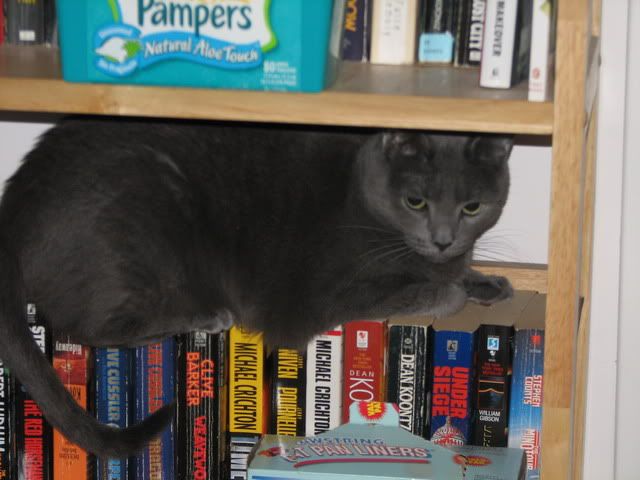This is another book I read in 2009. I was reading it when I went to the hospital in November. Every once in a while, I like to read "true crime" books by authors such as Ann Rule or John Walsh. I'd never read anything by Carlton Smith before.
Ken and Kristine Fitzhugh seemed to be one of those couples that were together, happy, and normal. They had two sons, both in college when she was murdered. They were involved in such wholesome activities like the PTA and Boy Scouts. She loved her job as an art teacher.
Then ... tragedy struck. Ken Fitzhugh was with two friends when he got a call from the school at which Kristine worked. She'd never shown up to teach her class and that was totally unlike her. So Ken stopped at home while the two friends waited and went to check and see what had happened. The two friends were shocked when Ken reappeared, asking for them to call 911. He'd found Kristine at the bottom of a flight of stairs. It appeared she'd fallen.
It appeared she'd fallen.
What really happened? Why?
The book goes on to explain it in that matter of fact way true crime stories unfold. I remember it was very depressing and was glad to finish it. It wasn't a bad book by any means, just sad.
Wednesday, January 27, 2010
Blood Will Tell by Carlton Smith
Posted by
Irishcoda
at
9:56 AM
1 comments
![]()
Labels: Books I've Read, True Crime
Monday, January 25, 2010
Gone With The Wind by Margaret Mitchell
When I was hospitalized in November, one of the first things I did was check out the floor's library. I'd read Gone With The Wind by Margaret Mitchell many times as an adolescent but I felt drawn to it. I'd watched the film with my son not too many months back and I remembered by struck by how differently I'd responded to it. I wanted to read the book for old times' sake but also to see how I'd feel about it as an adult.
I think I was about twelve the first time I read it. By the time I was fifteen, I must have re-read it a good half dozen or so times. I could never "get" what the deal was between Scarlett and Ashley, never mind what was happening with Scarlett and Rhett. Scarlett just seemed really unlucky in love. Rhett's motives were completely incomprehensible to me. Why would he want to marry Scarlett if he didn't love her and seemed contemptuous of her? I didn't understand.
I think just about everyone must have read or seen the book/movie. I decided to focus on the changes in my own understanding from the time I was a child to now.
This time around, I was really amazed by how selfish, spoiled and shallow Scarlett is. In fact, she seems to have some kind of personality disorder, almost an anti-social personality. She doesn't show feelings of empathy or connection to other people whatsoever beyond what they can do to serve her needs and wants. What kind of heroine is this? Ah, she seems to be an anti-heroine! She's pretty ruthless--using and abusing people until she's "done" with them and then she moves on with barely a backwards glance.
When I was a kid, Ashley was a knight in shining armor, the guy in the white hat. He was noble. Now, he just seemed weak and confused, unable to adapt well to the changing times brought on by the end of the Civil War. The poor guy couldn't make up his mind about Scarlett. He would say "No no no" with his words but many times his actions toward Scarlett said "Yes yes yes!" Well ... but not enough "yes"es to string her along the way he did.
What was up with that? Why was Scarlett so obsessed with Ashley? She explains it herself. She got a pretty picture into her head about him because he was the one young man she could never manipulate when she was gallivanting about the county, belle of the balls and collecting beaux. If she'd been able to "catch" him, she would have eventually become bored with him.
Melanie's the only character I "got" as both a child and as an adult. She is the true heroine of the story, an apparently weak but thoroughly strong woman in character and conviction. In the scenes I remember her best, she's doing her best to fiercely protect Scarlett. Scarlett, of course, never appreciated her in the slightest until it was too late!
I was totally clueless about Rhett until I re-read Gone With The Wind in November. It hit me overwhelmingly how much he'd loved Scarlett and how deeply she'd cut him over and over. She was the reason he kept returning to Atlanta during the war. Every time she needed help, he was always there. He did his very best to get her to love him back and she never did, not until it was too late. Why he kept on loving her is a little beyond me though. I think he tried to forget her but just couldn't.
No wonder it's called the greatest love story of all time!
Posted by
Irishcoda
at
4:52 PM
2
comments
![]()
Labels: Books I've Read
Friday, January 22, 2010
Paradise Alley by Kevin Baker
I found another book I read in 2009 called Paradise Alley by Kevin Baker. I was about to leave it at a book crossing, unread because I have so many. Luckily for me, I snagged it back at the last minute and decided to read it. I say luckily because it's easily one of the best historical fictions I've ever read.
It takes place in 1862, in New York City. President Lincoln had implemented a draft because of the Civil War. However, wealthy men could buy an exemption by paying to send a poor man instead. It sparked a destructive riot that went on for three days.
The book follows three women and three men during the course of that riot. They all either live or know someone in Paradise Alley, which was a waterfront slum. The riot coincides with the arrival of one of the women's deranged lovers, Dangerous Johnny Dolan. He is one of the scariest characters I've read about.
Kevin Baker is amazing. He knows his history and provides a wealth of facts without being a bore. He knows his characters. They are all unique--different backgrounds, different thoughts and beliefs, different ways of speaking and reacting. I rarely read a book that is as totally engaging and engrossing as this one.
Leave it at a book crossing site? Sorry, no. Now I plan to keep it because I'm sure I'll always want to go back and reread it!
Posted by
Irishcoda
at
4:04 PM
1 comments
![]()
Labels: Books I've Read
Sunday, January 17, 2010
Other Books Read From 2009
There are so many books I read in 2009 but didn't blog about them either because I didn't have time or wasn't motivated. Here are two more I remembered:
I'd first read this book soon after it was published, way back in 1970. My English teacher saw it being offered in those Scholastic Books monthlies we used to receive. She told me about it and wondered if I'd ever read it or if I wanted to. She was one of the few people at my high school that knew my parents were deaf. I read the synopsis and had to have it. I loved it. I was about 16.
I loaned it to my mother and she read it and hated it. She said it made the deaf seem stupid. I hadn't thought so and I thought she was incredibly small minded. It figured though. She and my father always complained about hearing people thinking them stupid and taking advantage of them. I was irritated that she didn't like it and felt she'd totally blown off the point of view/feelings of the hearing daughter character, Margaret.
Now that I'm an adult, I'm thinking I probably was more irritated that she was always blowing off my feelings and that this just seemed to me more of the same.
Nearly 40 years later, I figured I'd read it again and see what I thought.
I have to say I do understand why my mother felt as she did but I want to add that the apparent "stupidity" of the deaf characters is to make more apparent how hearing people can take advantage of deaf.
Here's how:
Janet and Abel Ryder are very young in the beginning of the story. They're in court, ready to appear before a judge. They're terrified. It's around 1920. I was very surprised that an interpreter shows up to sign for them. Having interpreters for the deaf in court and in hospitals is required now but let me tell you, it wasn't even into the mid-1970s.
Anyway, the reason Janet and Abel are in court is because they were rooked into buying a car they couldn't really afford. They didn't understand the terms of the contract at all--they didn't even realize they were supposed to be making payments. Worse, they wrecked the car in an accident! As the interpreter signs and elicits the story from the frightened Abel, it becomes clear that Abel was clueless. The interpreter is furious and accuses Abel of making the deaf community look bad. He becomes abusive. The judge says that Abel has to pay for the car, giving some of his salary every week until the debt is paid off.
Why was the young couple so ignorant? They were educated in a school for the deaf. In those days, education was practically non-existent in schools that followed the oral method of teaching. That means the day was spent learning to lipread and to speak. Forget reading. Forget writing. Forget math. Focus on moving mouths for hours. Without language, the mouths of course make no sense. The oralists didn't think about that one.
The crushing debt changes Janet dramatically. She was a young girl that liked to laugh and have fun. Over the years, she becomes bitter, withdrawn, secretive and angry. She resists Abel's attempts to have them socialize with other deaf people. She focuses only on making and hoarding money.
Janet and Abel have two children. The older child is Margaret, and I identified with her right away. The focus of the story shifts a little to Margaret. Isolated from others, forced to become an adult while she was still a little child, Margaret totally reminded me of me. She interpreted for her parents, advising them how to navigate the hearing world. She put the needs of her parents ahead of her own always. She was in a no-win situation because as a hearing person, her parents were always suspicious that she was conniving against them. It's a hard place to be.
The story spans a good forty years, a strong coming of age story. I have to say, though, that it is very depressing in many places. The section about Margaret's little brother Bradley was especially hard to take but it sure does illustrate a couple of major points and one of them was the complete communication breakdown between hearing and deaf. If you read the book, you'll know exactly which scene I mean.
by Leah Cohen
Speaking of education for the deaf in the United States ;), an enlightening book to read is Train Go Sorry.
What means train go sorry?
It's a deaf idiom, the deaf version of "you missed the boat". It's what happened to the deaf students Cohen wrote about at the Lexington School for the Deaf.
Leah Hager Cohen's grandfather was deaf. Her father was the superintendent of the Lexington School for the Deaf in the late 1960s on. Guess what! My mother went to Lexington in the '30s and I'd already heard plenty of horror stories about the miseducation of kids using the oral method of teaching.
Although the book focuses mostly on two students, Irina and James, plenty of other stories and anecdotes are there. I remember this one especially: a class is talking about Halloween. There's no signing allowed, just lipreading.
One student signs a question about Halloween. Is it a religious holiday?
The teacher doesn't know or accept the sign. The student attempts to spell the word 'religious' but can't figure out the right letters. So the teacher just says sorry, can't understand you and the student has to give up.
Yeah.
Train go ... sorry.
There's a lot of really good information in the book about deaf culture, teaching in sign language, mainstreaming, cochlear implants and a backlash against hearing paternalism. I'm glad I read it.
Posted by
Irishcoda
at
6:50 PM
0
comments
![]()
Labels: Books I've Read
Saturday, January 16, 2010
Schindler's List by Thomas Keneally
Once in a while, I’m gripped by the facts of a story so much I have to read it to the end even if I don’t like the style in which it’s told. Such is the case with Schindler’s List by Thomas Keneally. Oskar Schindler was an industrialist and speculator in Cracow, Poland during the Nazi occupation. He liked to drink and was an unashamed womanizer. He seemed an unlikely candidate for one to try and save as many of the Jewish population as possible and yet he did. He put his own life in harm’s way many times, sometimes very recklessly. Yet he did and the author couldn’t say for sure why. I say, thank God for Oskar Schindler.
At first, the Jewish people of Cracow were forced into a ghetto within the city. About a year later, the ghetto was violently shut down and the citizens rounded up and put into a nearby concentration camp run by the sadistic Amon Goeth. That guy was a monster. When he wasn’t beating or terrorizing his servants, he was out playing random shooter of prisoners. He’d go out with his gun, take aim at a prisoner (who knows why) and kill that person. Or he’d get angry over nothing and shoot a prisoner. Schindler stepped in and finagled his employees out of that horrible camp by building one of his very own behind his factory. He rescued the employees of a fellow industrialist by housing those employees in the same camp. At Schindler’s camp, the SS was not allowed to roam around beating or terrorizing inmates at will. Schindler paid and paid with bribe after bribe.
Eventually, the local concentration camp was ordered to close and every inmate was to be shipped to notorious camps like Auschwitz. Again, Schindler saved over a thousand people by relocating his factory and bribing officials to allow him to bring 1,100 of the inmates with him.
When the war was over, Schindler lost everything—all his money, property and jewelry. He and his wife had to run for their lives—accompanied by 8 of the inmates. All of the former Jewish people in the camp wanted to protect the Schindlers and wrote letters praising him for what he’d done. After the war was over, they supported him when he needed financial help and had him live with them in their homes (mostly in Israel) for several months out of the year. When he died, he was buried in Jerusalem and was mourned by people around the world.
I’d never heard of him before! I’d heard of the movie, of course, but hadn’t had a chance to see it. When I saw the book at a library sale, I picked it up and I am ever so glad I did.
The biggest challenge I had was getting through some of it because of the wording. I don’t want to use the adjective “ponderous” and I’m too lazy to find a milder word that means almost the same thing. Some really amazing stories, fables and fact came to light (for me) and so I was able to wade through the prose which just seemed really heavy. Oh well. I’m glad I read it anyway.
The book fits these challenges:
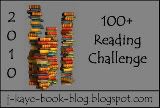


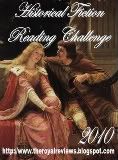
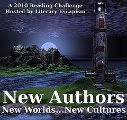
Posted by
Irishcoda
at
1:48 PM
0
comments
![]()
Labels: 100+ Reading Challenge, 2010 Historical Fiction Challenge, 2010 Wish I'd Read That Challenge, Books I've Read, New Authors Challenge
Sunday, January 3, 2010
Miss American Pie
Well, I just finished Book One for four of my five challenges, pretty darn good!
Miss American Pie by Margaret Sartor is actually a diary she kept between the ages of 13 and 18. When I realized what it was, I became even more interested because I could relate to it. I kept a diary starting when I was 12 or 13 and until I married my first husband.
I felt many of the things young Margaret felt: "Rained again. That's my life." "I hate these days with nothing to do." "Jesus, are you watching over me? I hope someone is." "The first time I thought about killing myself, I was about ten years old." Some of it is so mundane, some of it filled with so much pain.
Margaret is six years younger than me. She remembers many of the things I do--Watergate, for one thing. She grew up in Louisiana and remembers desegregation and rascism on a level I don't.
You can see her maturing and her ability to reason and figure things out through the years. She sure was boy crazy, I have to say that!
I have to admit that sometimes the book was boring -- but isn't that what our real lives are like?
The book fits these challenges:


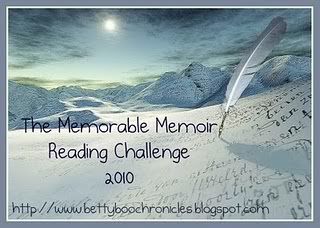


Posted by
Irishcoda
at
2:45 PM
0
comments
![]()
Labels: 100+ Reading Challenge, 2010 Wish I'd Read That Challenge, Books I've Read, Memorable Memoirs Challenge, New Authors Challenge
Saturday, January 2, 2010
Five Reading Challenges
I may be crazy but I decided to participate in five reading challenges this year. I'd probably let myself get carried away and do more but I figure I better put the brakes on now. Luckily, the lists can overlap. I wasn't going to choose my books this year but I'm thinking now I ought to at least try to. Otherwise, I'll get completely discombulated!
The first one is going to be a real challenge: read 100 books between Jan 1 and December 31, 2010! It will be a miracle if I can do that, considering the rate I'm reading now. Still, I'll give it the college try. Here's the first 25 I picked:
Miss American Pie Margaret Sartor
Schindler's List Thomas Keneally
The Given Day Dennis Lehane
Brooklyn Com Tolbin
Symptoms of Withdrawal Christopher Lawford
Nightmare House Douglas Clegg
Circus Fire Stewart Nann
Widow's War Sarah Gunning
Last Days of Dogtown Anita Diament
Blind Faith Joe McGinniss
1916 Morgan Llewellyn
Three Musketeers Alexandre Dumas
The Jungle Upton Sinclair
On The Beach Neil Shute
Invisible Man Ralph Ellison
Imperial Woman Pearl S. Buck
Those Who Save Us Jenna Blom
A Fractured Mind Robert B. Oxnam
Made in the USA Billie Letts
Bury My Heart at Wounded Knee Dee Brown
Everything She Ever Wanted Ann Rule
Welcome to the World Baby Girl Fannie Flagg
Lies My Teacher Told Me James Loewen
Hood Stephen Lawhead
Always Looking Up Michael J. Fox
I'll add more in later but I figure this would be a good start.
Wish I'd Read Challenge: The very same list!
The books above that fit into the historical challenge are:
Schindler's List
The Given Day
Brooklyn
Circus Fire
Widow's War
Last Days of Dogtown
1916
Three Musketeers
The Jungle
Imperial Woman
Those Who Save Us
Bury My Heart at Wounded Knee
Hood
Memorable Memoirs:
Miss American Pie
Symptoms of Withdrawal
A Fractured Mind
Always Looking Up
New Authors (ones I've never read before):
Miss American Pie
Schindler's List
Brooklyn
Nightmare House
Widow's War
Last Days of Dogtown
On The Beach
Invisible Man
Those Who Save Us
A Fractured Mind
Bury My Heart At Wounded Knee
Welcome to the World Baby Girl
Lies My Teacher Told Me
Always Looking Up
Mixology: I decided to read 30 books. Here's the breakdown:
New (10/15):
Schindler's List
Brooklyn
Symptoms of Withdrawal
Nightmare House
Widow's War
Last Days of Dogtown
On The Beach
Invisible Man
Those Who Save Us
A Fractured Mind
Classic Literature(4/5):
The Jungle
The Three Musketeers
On The Beach
Invisible Man
Women Authors (5/5):
Imperial Woman
Made in the USA
Welcome to the World, Baby Girl
Bury My Heart At Wounded Knee
Miss American Pie
Non-Fiction (5/5):
Symptoms of Withdrawal
Blind Faith
Lies My Teacher Told Me
Always Looking Up
Everything She Always Wanted
